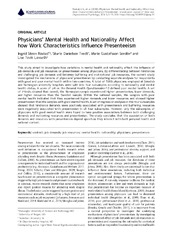| dc.contributor.author | Rostad, Ingrid Steen | |
| dc.contributor.author | Tvedt, Sturle Danielsen | |
| dc.contributor.author | Sendén, Marie Gustafsson | |
| dc.contributor.author | Løvseth, Lise T | |
| dc.date.accessioned | 2020-02-17T08:17:26Z | |
| dc.date.available | 2020-02-17T08:17:26Z | |
| dc.date.issued | 2018-09-24 | |
| dc.Published | Rostad IS, Tvedt SD, Sendén MG, Løvseth L. Physicians’ Mental Health and Nationality Affect how Work Characteristics Influence Presenteeism. Scandinavian Journal of Work and Organizational Psychology. 2018;3(1):1-15 | eng |
| dc.identifier.issn | 2002-2867 | |
| dc.identifier.uri | https://hdl.handle.net/1956/21418 | |
| dc.description.abstract | This study aimed to investigate how variations in mental health and nationality affect the influence of job demands and job resources on presenteeism among physicians. By differentiating between hindrances and challenging job demands and between buffering and motivational job resources, the current study investigated the mechanisms of physicians’ presenteeism by conducting separate analyses for respondents with good and poor mental health within two countries. A total of 1596 physicians employed at Swedish and Norwegian university hospitals were split into four subsamples according to nationality and mental health status. A score of ≥4 on the General Health Questionnaire-12 defined poor mental health. A set of t-tests showed that overall, the Norwegian sample experienced higher presenteeism, lower demands, and higher resources than the Swedish sample. Within the national samples, the samples with poor mental health indicated that they experienced higher demands and lower resources and showed higher presenteeism than the samples with good mental health. A set of regression analyses in the four subsamples showed that hindrance demands were positively associated with presenteeism and buffering resources were negatively associated with presenteeism in all four subsamples. However, only the subsamples of physicians with good mental health were found to have positive associations between both challenging demands and motivating resources and presenteeism. The study concludes that the association of both demands and resources with presenteeism depend upon how they interact with both personal health and national context. | en_US |
| dc.language.iso | eng | eng |
| dc.publisher | Stockholm University Press | eng |
| dc.rights | Attribution CC BY 4.0 | eng |
| dc.rights.uri | http://creativecommons.org/licenses/by/4.0/ | eng |
| dc.subject | Context | eng |
| dc.subject | Job demands | eng |
| dc.subject | Job resources | eng |
| dc.subject | Mental health | eng |
| dc.subject | Nationality | eng |
| dc.subject | Physicians | eng |
| dc.subject | Presenteeism | eng |
| dc.title | Physicians’ Mental Health and Nationality Affect how Work Characteristics Influence Presenteeism | eng |
| dc.type | Peer reviewed | |
| dc.type | Journal article | |
| dc.date.updated | 2019-09-10T11:40:35Z | |
| dc.description.version | publishedVersion | |
| dc.rights.holder | Copyright 2018 The Author(s). | eng |
| dc.identifier.doi | https://doi.org/10.16993/sjwop.51 | |
| dc.identifier.cristin | 1656345 | |
| dc.source.journal | Scandinavian Journal of Work and Organizational Psychology | |

